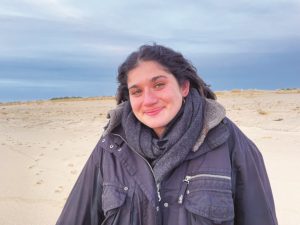PROVINCETOWN — Amelia Roth-Dishy joined the Provincetown Independent as a Mary Heaton Vorse Fellow on Monday, Jan. 30. On Tuesday, she found herself roaming the waterfront looking at dead birds.
A New York City native, Roth-Dishy graduated from Harvard in December with a degree in history and literature. She had a secondary concentration in philosophy.

In college, Roth-Dishy wrote for the arts section of the Harvard Crimson and later served as its editor-at-large. An interview Roth-Dishy conducted with a Survivor contestant was once the most-read article on the Crimson’s website.
“I have not written about dead birds before,” Roth-Dishy says. But as she dug into her first assignment, she noticed how elements of her undergraduate studies came into play. “I kept thinking about how a breaking news story like this, about one moment in time, might connect to history and to a bigger picture.”
At Harvard, Roth-Dishy studied and wrote about transportation history and city planning, race, Jewishness, and performance in the early 20th century, often using historical newspaper accounts in her research. She also worked at Y2Y Harvard Square, a student-run shelter for young adults experiencing homelessness.
“Maybe what these things have in common is that they all have to do with race, identity, and place,” Roth-Dishy says. “I am interested in how communities constitute themselves, and how that gets translated into cultural history.”
In the fall of 2020, when the pandemic interrupted many college students’ trajectories, Roth-Dishy took a semester off and went home to Manhattan, where she got a job writing for the West Side Rag, a news site covering her neighborhood. “I did it to stave off boredom,” Roth-Dishy said, “but I quickly caught the local journalism bug.”
The Rag was then covering the city’s pandemic-inspired effort to move people from congregate living situations into single-room-occupancy lodgings. As buildings that had been small hotels were taken by the city for that purpose, community pushback and hostility toward the men who moved in grew, Roth-Dishy says. The neighborhood dynamics were important, “but without the Rag many real on-the-ground stories would not have been told.”
Roth-Dishy’s role at the Independent is funded by the Murray/Reese Foundation through the Local Journalism Project — the nonprofit organization that partners with the newspaper to provide opportunities for aspiring community reporters.
Like the Vorse Reporting Fellow before her, Roth-Dishy has not spent any time on the Outer Cape before this winter.
This month, she is staying at the Mary Heaton Vorse house thanks to the generosity of the Provincetown Arts Society. Vorse was a trailblazing journalist and civil rights activist whose legacy is an inspiration for the Independent’s winter fellowship program.
Roth-Dishy is now reading Vorse’s Time and the Town: A Provincetown Chronicle. “Curiosity and generosity seem like her defining traits,” she says of Vorse. “I think that’s how she wanted to show up both in the wider world and right here on Commercial Street. I’m inspired by the way her stories create a record of how history unfolded here. I hope to be able to keep in mind her example as I navigate this experience.”
When not writing, Roth-Dishy loves to hike, camp, and be outdoors and has served as a trip leader for both tweens and college freshmen. She is a significantly below-average knitter, she says, and a slightly above-average receptacle of pop culture trivia. —The Editors



